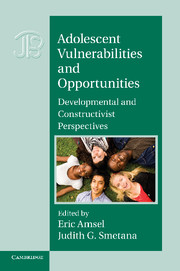
-
Select format
-
- Publisher:
- Cambridge University Press
- Publication date:
- 07 October 2011
- 19 September 2011
- ISBN:
- 9781139042819
- 9780521768467
- 9781107423602
- Dimensions:
- (228 x 152 mm)
- Weight & Pages:
- 0.49kg, 228 Pages
- Dimensions:
- (229 x 152 mm)
- Weight & Pages:
- 0.34kg, 228 Pages
- Subjects:
- Sociology: General Interest, Developmental Psychology, Psychology, Sociology, Educational Psychology
You may already have access via personal or institutional login- Subjects:
- Sociology: General Interest, Developmental Psychology, Psychology, Sociology, Educational Psychology
Book description
This book explores the central importance of adolescents' own activities in their development. This focus harkens back to Jean Piaget's genetic epistemology and provides a theoretically coherent vision of what makes adolescence a distinctive period of development, with unique opportunities and vulnerabilities. An interdisciplinary and international group of contributors explore how adolescents integrate neurological, cognitive, personal, interpersonal and social systems aspects of development into more organized systems.
Reviews
“Piaget would not have been surprised by the adolescents of the 21st century. In this worthy addition to the distinguished Jean Piaget Symposium Series, the editors begin with a Piagetian vision of adolescents as rational agents and active contributors to their own development, which is seen as a constructive process of coordination and reflection. The authors proceed in a variety of disciplinary, theoretical, and empirical directions, so there’s plenty for everyone in this diverse collection.”
–David Moshman
"...Overall, the book highlights adolescents' coordinating activities in support of their own development as a constructivist process worthy of continued research.... Highly recommended..."
--L. E. Barnes-Young, American Military University, CHOICE
Contents
Metrics
Full text views
Full text views help Loading metrics...
Loading metrics...
* Views captured on Cambridge Core between #date#. This data will be updated every 24 hours.
Usage data cannot currently be displayed.
Accessibility standard: Unknown
Why this information is here
This section outlines the accessibility features of this content - including support for screen readers, full keyboard navigation and high-contrast display options. This may not be relevant for you.
Accessibility Information
Accessibility compliance for the PDF of this book is currently unknown and may be updated in the future.


